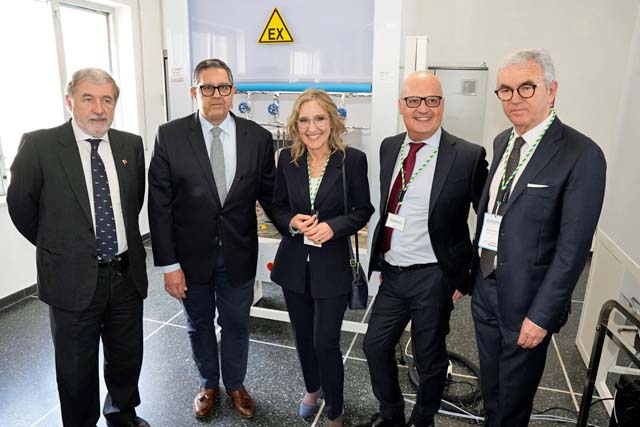A new laboratory, named CapLab, has been inaugurated in the Post of Genoa, resulting from a partnership between Ecospray and the University of Genoa, and which will be used to study new fuel cell-based carbon capture solutions to be applied in the maritime and industrial sectors.
The facility will be managed by Ecospray Technologies and the Department of Civil, Chemical and Environmental Engineering (DICCA) of the University of Genoa and is the result of a €2m investment. Its initial focus will be on maritime applications.
The CapLab strength is considered to lie in the synergy between research and industry, stemming from the partnership between its two founders, in an alliance that, under the two organisations, aims to promote progress in science and training that can hopefully have a positive impact on the region. At the core of CapLab’s activities is research into CO₂ reduction systems based on the use of Molten Carbonated Fuel Cells (MCFC), one of the three new carbon capture technologies launched by Ecospray in June 2022.
CapLab’s main fields of research will be:
- Carbon capture
- Clean energy production
- Production and use of hydrogen
- Applications in the maritime sector
- Applications in the industrial sector (power generation, steel plants etc.)
- Integration with renewable sources (bio-LNG, e-methanol)
Specifically, CapLab projects will be implemented in the production and testing of MCFCs and as an IT laboratory for cell modelling. It will jointly participate in international and national research programs, in tenders for research funding and training (dissertations and training internships, establishment of research grants, development of studies, research and educational activities, organisation of training activities or company retraining through university teaching activities).
The MCFC carbon capture technology developed by Ecospray in collaboration with the DICCA enables the capture of CO2 and, as a secondary benefit, energy production. As such, this technology is considered strategic in the context of the energy transition, precisely because of its capacity to capture the CO2 in exhaust fumes and generate additional clean energy.
This is a technologically complex solution, but it is thought to guarantee the best results in terms of reducing emissions, as well as keeping operating costs low for maritime companies. The technology is not limited to a specific type of vessel: it can be used on all types of engines and with all types of fuels. Application of MCFC technology can efficiently support the transition from the fossil fuel-based era to a future CO₂-free era. The first fuel cell prototypes will be produced at CapLab in the coming months, and the first on-board tests are scheduled for 2024.
The absorption of CO₂ with amines is based on an approach that is already well-established in other industrial sectors, which Ecospray has brought to the marine sector to reduce the environmental impact and energy consumption of ships. The absorption of CO₂ using calcium hydroxide is another innovative technology in terms of capital required for its application and use. The installation of these two technologies on board a ship for a field test phase is imminent.



